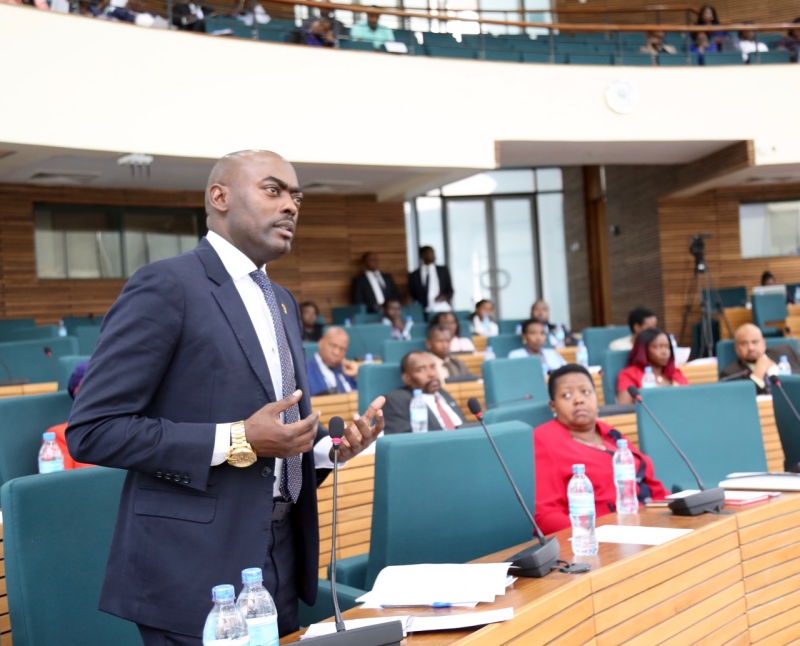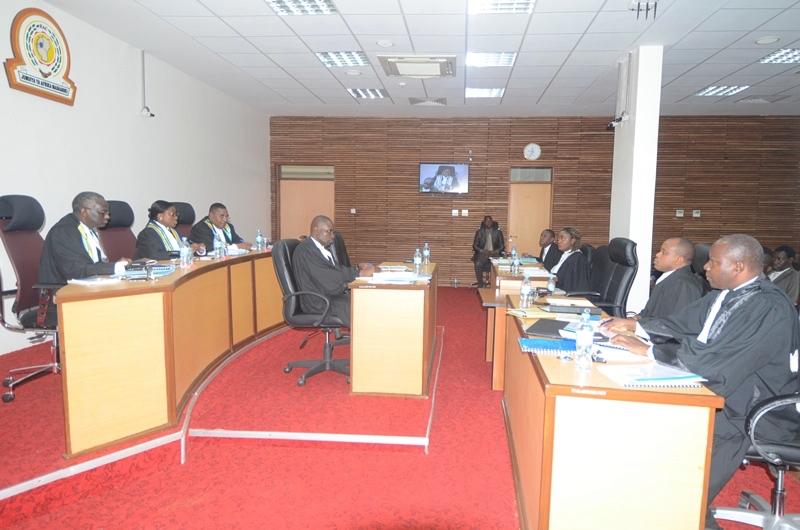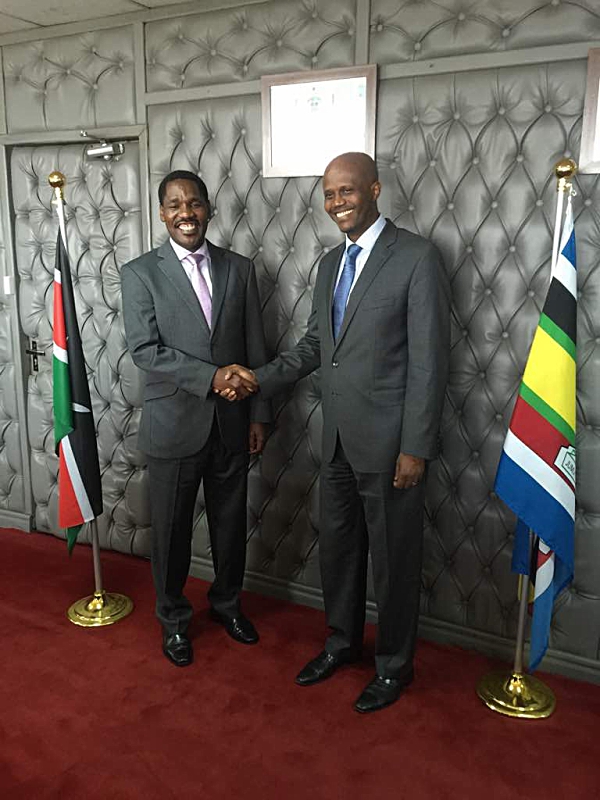
Posted in Press Release
East African Legislative Assembly, Arusha, March 7, 2018:
The East African Legislative Assembly has passed a resolution granting leave to Hon. Fred Mukasa Mbidde and any other Member of the Assembly who may want to intervene, and/or appoint lawyers to represent it in the case Reference No. 02 of 2018 in the East African Court of Justice (EACJ). In the same vein, the Assembly further agreed that Hon Mbidde makes use its records at the Court for the Reference which is challenging the election of the Speaker.
The motion moved by Hon Mbidde himself, received support as the House convened this morning. Reference No. 02 of 2018 filed by the Attorney General of the Republic of Burundi versus the Secretary General of the Community is challenging the election of the Speaker done in December 2017.
Hon Mbidde stated in his Motion that EALA duly met from 15th - 23rd December 2017 to perform its inaugural activities in line with the provisions of the Rules of Procedure of the Assembly, specifically Rules 4, 5, and 6 that concern the notification of the First Sitting of a new Assembly (Rule 4), List of Members and Administration of Oath (Rule 5) and Election of Speaker (Rule 6).
The Assembly was further told the matters raised in the Reference before Court touch on the sanctity of the Assembly within its jurisdiction and therefore it should be well represented in Court, the absence of which may lead to misrepresentation of the Assembly.
The legislator sought permission from the Assembly as is stipulated in the Act and attendant EALA Rules of Procedure. Article 40 of the Treaty and Section 20(1) of the Assembly Powers and Privileges Act 2003 states thus:
“Notwithstanding the provisions of any other law, no Member or Officer of the Assembly and no person employed to take minutes or record evidence before the Assembly or any Committee shall, except as provided in this Act, give evidence else-where in respect of the contents of such minutes or evidence or of the contents of any document laid before the Assembly or such a Committee, as the case may be, or in respect of any proceedings or examinations held before the Assembly or such a Committee, as the case may be without the special leave of the Assembly first had and obtained in writing”;
The Rules of Procedure of the Assembly, (Rule 23) further stipulate the manner and processes through which Journals and Records of the House, including all papers and accounts presented to or belonging to the House, are kept, processed or transmitted only under the express leave of the House, or order of the Speaker.
Several Members rose in support of the Resolution before it was put to a vote. Hon George Odongo reminded the Members that EAC citizens are expecting a lot from the legislators and urged the House to move on with haste.
Hon Fatuma Ibrahim remarked that the House had elected its Speaker and therefore supported the Motion to grant the mover of the Resolution leave to defend the Assembly in the Reference. Others who rose in support were Hon Kasamba Mathias, Hon Dennis Namara who said it was necessary to support the Motion in line with the decision (election of Speaker) in December 2017.
Hon. Rose Akol, called for clarity with respect to who will represent EALA to avoid situation of misrepresentation of facts while Hon. Simon Mbugua urged Members to continue with the House business before it in its quest to be advocates of integration.
Hon. Mary Mugyeni also supported the motion. Prior to the motion by Hon Mbidde, the Assembly moved a motion under Rule 30(d) and the corresponding Rule 84(1) on suspension of a rule and in this particular case that on Rule 12 on quorum of the House. The motion was moved by Hon Chris Opoka and seconded by many Members including Hon Susan Nakawuki, Hon Abdikadir Aden, Hon Fatuma Ibrahim among others. Only two Members from the Burundi Chapter, Hon Sophie Nsavyimana and Hon Christopher Nduwayo were in the House then.
Yesterday, the First Instance Division of the EACJ convened and struck out the Application No 3 of 2018, arising from Reference No 2 of 2018, filed by the Attorney General, Republic of Burundi, seeking Court’s order to stay recognition of the Speaker of the East African Legislative Assembly (EALA). A media release dispatched by the EACJ stated a three Judge Bench (Honorable Judges Lady Justice Monica Mugenyi (Principal Judge), Justice Isaac Lenaola (Deputy Principal Judge), and Justice Fakihi A Jundu) in their Ruling, reiterated that the Application had since been overtaken by events and that the real dispute would be conversed in the substantive Reference.
According to the media dispatch, the Court added that though Counsel for the Applicant (Burundi) did understand that an order for non-recognition of the Speaker entails suspension of the Assembly, that it was neither argued that/ nor the Assembly was an issue in the matter, that it is the view of the Court that the Office of the Speaker is the issue in the Application and that the holder thereof has since duly commenced his functions.
“The Court therefore struck out the Application and ordered that the Reference (main case) challenging the entire elections process of Speaker of the Assembly be heard expeditiously”, the statement from the EACJ, said in part.
Meanwhile, the House resumes on March 13th, 2018 with Committee Sittings resuming tomorrow, through to Monday, March 1th, 2018, in the interim.
-ENDS-
For more information, please contact:
Bobi Odiko
Senior Public Relations Officer
East African Legislative Assembly
Arusha, Tanzania
Tel: +255-27-2508240
Fax: +255-27-2503103
Cell: +255-787-870945, +254-733-718036
Email: BOdiko [at] eachq.org
Web: www.eala.org
About the East African Legislative Assembly:
The East African Legislative Assembly is the Legislative Organ of the East African Community. Its Membership consists of a total of 62, of whom 54 are elected Members (9 from each Partner State) and eight ex-officio members (the Ministers responsible for EAC Affairs from the Partner States, the Secretary General of the Community and the Counsel to the Community).
The East African Legislative Assembly has legislative functions as well as oversight of all East African Community matters. The enactment of legislation of the Community is effected by means of Bills passed by the Assembly and assented to by the Heads of State, and every Bill that has been duly passed and assented to become an Act of the Community and takes precedent over similar legislations in the Partner States. EALA has to date passed 79 pieces of legislation.

Posted in Press Release
East African Court of Justice Arusha, 7th March 2018:
The First Instance Division resumed its March sessions and struck out the Application filed by the Republic of Burundi, seeking Court’s order to stay recognition of the Speaker of the East African Legislative Assembly (EALA). The Court in its Ruling said that the Application has been overtaken by events and that the real dispute will be conversed in the substantive Reference.
The Court added that though Counsel for the Applicant (Burundi) did understand that an order for none recognition of the Speaker entail suspension of the Assembly, that it was neither argued nor the Assembly was an issue in the matter, that it is the view of the Court that the office of the Speaker is the issue in the Application and that the holder thereof has since duly commenced his functions.
The Court therefore struck out the Application and ordered that the Reference (main case) challenging the entire elections process of Speaker of the Assembly be heard expeditiously.
Before the ruling was delivered, Court also had disallowed the Application filed by Hon. Mukasa Fred Mbidde, seeking to amend his application to join the matter as an intervener opposing the Applicant instead of joining as amicus curiae (friend of the Court). Hon .Mbidde before had applied to join the matter an amicus curiae, however he was changing the position from amicus curiae to intervener because he has interest in case him being an EALA Member which the Court declined to allow and he later withdrew because he would not proceed without amendments.
This case is the 1st one being filed by a Partner State against the Community, under Article 28 which provides mandate to Partner States to file a case to Court. All the cases the Court has handled are matters brought by Individuals or None Governmental Organizations (NGOs) or the Bar Associations under Article 30 of the Treaty (Natural or Legal person).
The Republic of Burundi in the Reference is challenging the election of the Speaker of EALA, arguing that, the Assembly did not follow Rule 12 of the Rules of Procedure of the Assembly, which requires the quorum of one third (1/3) of the elected Members from each Partner State, yet Burundi and the United Republic of Tanzania did not participate in the elections. Burundi is therefore asking court to declare that the election violated rule 12 (1) of EALA Rules of Procedure and order for re-election of the Speaker in accordance with the Rules of procedure.
The matter was brought before Honorable Judges Lady Justice Monica Mugenyi (Principal Judge), Justice Isaac Lenaola (Deputy Principal Judge), and Justice Fakihi A .Jundu,
Notice for Editors
Rt. Hon Martin Ngoga (current Speaker) from the Republic of Rwanda who was elected Speaker of EALA on 19th December 2017. Rt Hon Ngoga polled 33 votes in the second round of voting against Hon. Leontine Nzeyimana of Burundi who amassed 3 votes and Hon Adam Kimbisa of the United Republic of Tanzania did not receive any vote. Rt. Hon. Ngoga replaced Hon. Daniel Kidega from the Republic of Uganda whose term expired. According to the Treaty, the position of the Speaker of EALA is rotational.
For more information, please contact:
Yufnalis Okubo
Registrar
East African Court of Justice
Arusha, Tanzania
Tel: +255 27 2162149
mail: Okubo [at] eachq.org
www.eacj.org
About the East African Court of Justice:
The East African Court of Justice (EACJ or ‘the Court’), is one of the organs of the East African Community established under Article 9 of the Treaty for the Establishment of the East African Community. Established in November 2001, the Court’s major responsibility is to ensure the adherence to law in the interpretation and application of and compliance with the EAC Treaty.
Arusha is the temporary seat of the Court until the Summit determines its permanent seat. The Court’s sub-registries are located in the respective National Courts in the Partner States.


